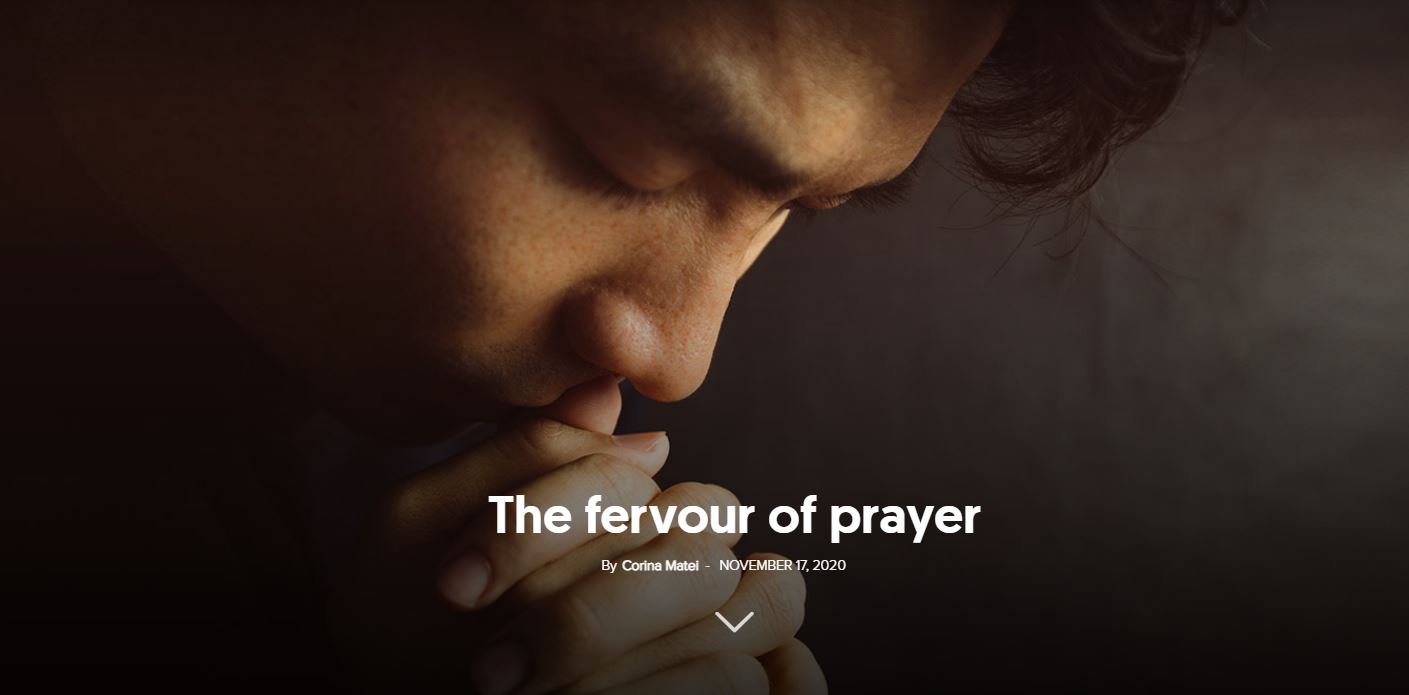“We need a bigger vision in prayer. We need God’s vision! Let’s keep praying and daring to ask for more—for God’s glory, that the gospel may go into all the world, into all nations, that Jesus may come!”[1]
The longing to draw closer to God in prayer has spanned millennia and is found in the soul of every Christian who strives, with all their might, to remain on the Way.
What follows is the fruit of a year in which I set out, from the very beginning, to delve deeper into the mystery of the connection we establish with our Creator and Redeemer in a transcendental manner, through prayer. These are observations and conclusions that have been revealed to me not only theoretically, through texts or direct confessions of wonderful people of prayer, but also by living them out. The sources of inspiration have been: the words of the Saviour, various biblical characters, Ellen White, Cindy Tutsch, Melody Mason, pastors, elders, young and old believers, men and women, both from my country and abroad. I am grateful to them all and I am delighted to share their spiritual richness with others.
But why should we be so concerned about acquiring what Ellen White called the “breath of the soul”? Because being a “person of prayer” is not just the privilege of a few Christians, a rare divine gift scattered sporadically throughout the churches, but rather an attribute that should characterise every life of faith.
Considering the times we live in, it would be desirable for all of us to become people of prayer, which would help us withstand adversity, be strengthened and encouraged, and remain children of God for eternity.
In this article, I have chosen to present reflections from my experience so far, with the awareness that prayer entails a perpetual journey of drawing near to God and a deepening of our fruitful dialogue with Him. Simultaneously, prayer revitalises our souls and facilitates our connection with one another, nurturing the coveted bond of brotherly love, “philadelphia.”
Encouragements
The most inspired starting point has been to consider those timeless and invaluable biblical exhortations found in the Gospels: “Therefore I tell you, whatever you ask for in prayer, believe that you have received it, and it will be yours” (Mark 11:24). Hence, let us take possession of what we have requested according to God’s will: when we rise from our knees, let us act with the full power we have already received while praying. This attitude of trust will safeguard us from the powerless “form of godliness” that some inwardly deny, thus rendering any prayer ineffective. Furthermore, let us express gratitude in advance to God for the protection we seek against any assault from evil forces.
Among the Saviour’s exhortations, there are several aimed at purifying and preparing our spirits before Him: “And when you stand praying, if you hold anything against anyone, forgive them, so that your Father in heaven may forgive you your sins” (Mark 11:25); “And when you pray, do not be like the hypocrites. […] But when you pray, go into your room, close the door and pray to your Father, who is unseen. Then your Father, who sees what is done in secret, will reward you” (Matthew 6:5-6); “And when you pray, do not keep on babbling like pagans […] for your Father knows what you need before you ask him” (Matthew 6:7-8).
In the epistles of the New Testament, I have particularly noticed a few exhortations that reveal the conditions under which our prayers are effective: “The prayer of a righteous person is powerful and effective” (James 5:16). Indeed, righteousness is attributed to us solely by God’s grace, but what is within our control is to pray fervently, engaging our whole being in the cause for which we plead. Let us not remain lukewarm like the Laodiceans (Revelation 3:16), whose self-sufficiency hinders their communication with Heaven.
The testimony of the apostle Paul unveils the depth of our dependence on divine power: “For when I am weak, then I am strong” (2 Corinthians 12:10). Indeed, it is only when we acknowledge our own weakness and humble ourselves, confessing our sins with repentance, that we can be guided by the Almighty through true miracles.
Furthermore, we must not limit God based on our own patience, goodwill, mercy, or compassion when interceding for others in prayer or when seeking forgiveness for ourselves. This is what Ellen White urges us to do: “Your wants, your joys, your sorrows, your cares, your fears, you may present before God. You cannot weary Him, you cannot burden his heart.” The author emphasises that God’s plan includes things that only come to fruition as a response to prayer and would not otherwise happen. Regarding the open attitude towards action and positive change that should follow our prayer to God, we are warned that “he who does nothing but pray will soon cease to pray, or his prayers will become a formal routine.”[2] The beneficial effect of active prayer followed by deeds is that it refines our character, shapes our will and courage, and makes us effective through the power of God.
Principles of prayer
Of course, this list of principles designed to nourish our devotion and bring forth good fruit in our prayer life is not exhaustive. Readers can supplement it through their own study and personal experience.
Our requests in prayer should be in accordance with the Word of God, as well as what we consider to be received answers. This standard protects us from going astray and helps us stay within the framework of God’s will. Only through close communion with God and His Word do we learn to discern His voice and guard against the allure of other deceptive “voices.”
Prayer becomes the “breath of the soul” when its power is felt in our lives through the joy, eagerness, and peaceful practice of it, through gratitude and praise to God. It will not become a burden, a ritual, an automatic response, or a hypocritical attitude, but a constant need and desire. The Gospels depict Jesus Christ praying for hours and nights on end, indicating that He found solace for His soul in this communion with the Father.
God shows us that those who have developed the habit of prayer as communion with Him will never be alone and will have inner peace even in the midst of life’s storms. Furthermore, prayer can be the framework for the greatest inner freedom. This is exemplified by the testimonies of Lutheran pastor Richard Wurmbrand during his period of imprisonment, starting with the title of his book, “With God in the Underground.”
We can submit ourselves to God just as the Saviour did after prayer, receiving the strength to perform the actions given by the Father and the wisdom to speak the words given by the Father. Otherwise, we risk doing what is not given to us and not doing what is given to us personally.
As we delve deeper into the revealed Word and get to know the Word made flesh more and more, we will learn to distinguish His voice in the dialogue of prayer. However, even clumsy and unwise prayers, when honest, can be carried before the throne of grace through the unspoken groanings with which the Holy Spirit intercedes for us.
First and foremost, prayer is a solemn privilege of being admitted in the presence of the King of kings, who is at the same time our great loving Friend, eagerly waiting for us to take the initiative.
The friendship expressed in prayer is unequal in the sense that He knows us fully and offers us everything, while we know Him only partially and ask for little. However, as we progress in knowing Him, our love for Him will grow, filling us with life and confidence. The Saviour’s expression about having “life to the full” is synonymous with having “love to the full.”
Our friendship with Him helps us understand that the gifts are given to us to be used in the service of God for the spiritual benefit of all. We will also find that we will be tested regarding what we ask for and receive through prayer, as well as what we proclaim.
Unceasing prayer involves maintaining an ongoing, open dialogue with God in every daily activity, as a constant background of our mind. This will bring us complete trust in His will for us, even if it doesn’t align with our desires and even if we sometimes don’t understand it. This trust will also help us avoid categorising our prayer motives as important or trivial because we do not know what is truly important.
When we pray for the problems of others, God takes care of our own.
In prayer groups and within the church community, prayers should be concise, specific, encompassing everyone present, and fostering unity. These prayers are the result of the intimate prayers we practise in the comfort of our homes, in our daily lives, where we can extend our dialogue with God as much as we need.
Miracles experienced as a result of prayer should not be seen as lifelong guarantees, but rather as indications of the divine goodness that increasingly pours out upon those who grow in faith.
When fasting accompanies our prayers, we possess the most effective means to resist the evil one and drive him away from around us and within us.
Desirable perspectives
God desires us to be united through brotherly love, and communal prayer is the strongest bond, accessible even in challenging conditions of scarcity, danger, and crises, because it is purely spiritual and transcends constraints. In prayer, we have the environment that unites and brings believers closer in the presence of God. Especially within small prayer groups, Christian virtues related to human interaction can develop within us: empathy, altruism, compassion, collaboration, solidarity, consistency, and gratitude. Furthermore, unlike solitary prayers, we know that the Saviour is present in the midst of those gathered in His name (Matthew 18:20). This is the golden promise of a life of worship, so let us cherish it!
Corina Matei provides a systematic review of the most significant experiences regarding individual prayer and the practice of group prayer accumulated in 2022.




















